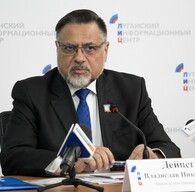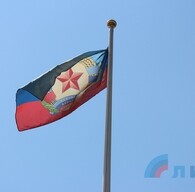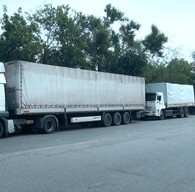The position of the Ukrainian representative blocked constructive work in the Contact Group subgroup on political settlement issues, press secretary of the Lugansk People’s Republic delegation in the Contact Group Maria Kovshar said after a video conference on Tuesday.
“Ukraine exercised in reading aloud and clownery instead of substantive work at the session of the political subgroup,” Kovshar said. “Despite all attempts, the representatives of Donbass and Russia were unable to guide Ukraine towards meaningful activity, and no substantive work was carried out on the agenda.”
“Throughout the session, Ukraine used all possible ways to try to avoid productive work on the subgroup’s key task, the development of the Action Plan (Road Map) on settling the conflict in accordance with the Minsk Agreements,” she said.
“At first, the Ukrainian representative tried to turn the session into a lesson in reading aloud, reciting his answers to questions of (former) coordinator (of the subgroup for the OSCE Pierre) Morel. The representative had stubbornly refused to circulate the copies of these answers among the participants at previous sessions. Next, he pretended that he did not hear the hard questions asked of him, and began answering his own questions offering all other participants to join his discussion with himself,” the LPR delegation representative said.
“The answers to all secondary questions of (former coordinator Morel) regarding the positions on the Road Map, have been forwarded in written form by the Donbass Republics to the participants in the talks,” she said.
Having scrutinized them, the Russian Federation assessed them as logical and conforming to all the commitments of the Republics and Ukraine within the Minsk Agreements, and therefore officially supported the Republic’s position in a written statement. It follows that the Ukrainian delegation is persevering in wasting time in order to avoid substantive work. The Ukrainian representative did not reply to the question if he had read our documents. The Republic’s representatives made it clear that the documents which had not been officially presented to all the parties to the talks cannot be discussed or worked on,” Kovshar said.
In early October 2020, LPR and DPR representatives submitted a Road Map for consideration by the Contact Group. It was a step-by-step plan for a comprehensive peaceful settlement in Donbass based on the Minsk Agreements. Following numerous attempts to avoid the work on the document, Kiev brought forward its own “Plan of Joint Steps” in early November. The Ukrainian proposals were not coordinated in the Contact Group and reflected Kiev’s position which contradicted the Minsk Agreements.
The Ukrainian government launched the so-called anti-terrorist operation against Donbass in April 2014. Conflict settlement relies on the Package of Measures for the Implementation of the Minsk Agreements, signed on February 12, 2015 in the Belarussian capital by the Contact Group members and coordinated by the Normandy Four heads of states (Russia, Germany, France and Ukraine). The UN Security Council approved the document by Resolution No 2202 of February 17, 2015 and called upon the parties to ensure its implementation.
The document provides for comprehensive ceasefire, withdrawal of all heavy weapons from the contact line, starting a dialog on reconstruction of social and economic ties between Kiev and Donbass. It also envisages carrying out constitutional reform in Ukraine providing for decentralization and adopting permanent legislation on a special status of certain areas of the Donetsk and Lugansk regions.
To facilitate the work of the Contact Group, four working groups were set up under its aegis to deal with issues of security, politics, return of internally displaced people and refuges, as well as with social, humanitarian, economic and rehabilitation issues. *i*s


